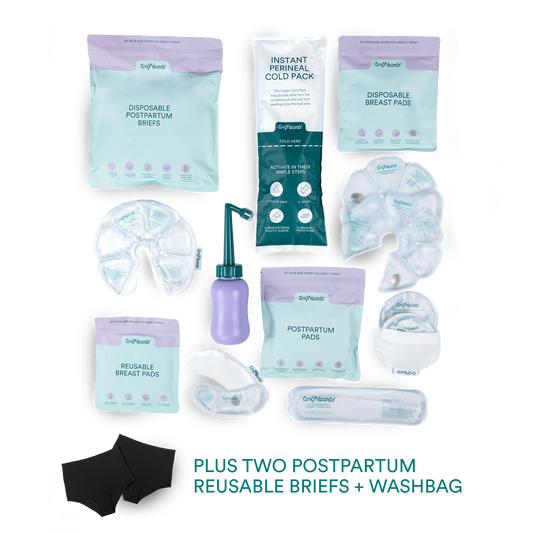
Just found out you're expecting? Congratulations!
While you're both about to experience a whole new part of life, your experience will most likely differ to your pregnant partners'. For the next nine months, your pregnant counter-part will become your number one priority, and that can take some adjusting.
To help you through this exciting time, we’ve created the ultimate partner’s guide to pregnancy to help talk you through all the emotions you may feel, what your partner may feel and things you can do to help.
First Trimester
The first trimester is often met with both fear and excitement. Whether you were trying for a baby or not, the fact that your partner is pregnant is big news, huge news in-fact.
Are you feeling mixed emotions? That’s entirely normal; the first 13 weeks will allow you to soak up the idea of parenthood and to think about how your lifestyle will change to accommodate your newest family member.
I’m feeling a bit left out…
Some partners can feel left out during the early stages of pregnancy as they try to establish their role in this nine-month journey. Some may also feel jealous of all the attention their partner is receiving, but it's important to remember this is normal.
If you begin to feel left out, neglected or jealous of your partner, remember that they have a baby growing inside them and that can come with a whole range of emotions that you may not be experiencing. Attention is can also be unwanted, especially from over-excited family and friends, so try and put yourself in their shoes.
If you are worried, talk to your partner about it and let them know how you're feeling.
What your Partner May Experience
- Mood swings: Your partner’s hormones will change throughout their pregnancy which can cause mood swings, especially in the early stages of pregnancy. It's important not to take these personally and expect emotional ups and downs. Remember these will pass as the pregnancy progresses.
- Morning sickness: If your partner is experiencing morning sickness try and work together to help assist her through this period. Work out what foods trigger nausea and vomiting and what foods help or if there’s a particular food smell that causes nausea don’t have it around your partner.

Things to Do
- Create a budget: Having a baby will alter your current lifestyle and financial obligations. Whether you’re condensing two incomes into one, considering part-time work or looking into childcare, now is a good time to start thinking about your family's budget. Work out what is going to the best course of action for your family once the baby is born. Will you need a stay-at-home parent, if yes, who will take on that role? Who will look after the baby while you're both at work? Where can you cut back on living expenses?
Second Trimester
Starting to feel like the whirlwind of pregnancy is finally beginning to settle down? Welcome to the second trimester!
For most couples, you may find that Mama bear is starting to feel better and the mood swings are easing (thank god). As their partner now is the best time to let the thought of becoming a parent sink in, to start planning for your baby’s arrival and to think about your eating and exercising habits.
Healthy eating and light exercise is highly recommended throughout pregnancy. It’s vital that you adopt the same healthy diet and exercise plan, so your partner feels supported rather than being told what to do or what to eat.
Still not feeling real?
For some parents, seeing the baby at a 12-week scan can make the whole experience feel real. But for others the pregnancy still may not some real in the second trimester - this is normal! As the parent who isn't carrying the child, it may take more time for it feel real as you physically can’t feel a baby growing inside you. Some may not even believe it until the baby is born - which again is standard!
The best thing to do in this situation is to talk about your feelings with your partner or talk to a friend or family member who's been in your position before.
What your Partner May Experience
- Food cravings: Take our advice, if your partner is craving a specific food just give it to them - even if it is cereal covered in Vegemite!
Things to Do
- Birth classes: These classes are an excellent way to help prepare both yourself and your partner for labour, birth and life after bub's arrival.

Third Trimester
Your bub is now three months away - you’re so close to the finish line! During this trimester your partner will probably start to feel excited, nervous and uncomfortable as they move into the late stages of pregnancy.
Now is the time to prepare for your birth support role, your partner is going to rely on you heavily during the next few months, so it’s vital to ensure you’re educated and prepared for the road ahead. This will be an emotional time for yourself, you’ll experience a wide range of emotions but just remember at the end of it you’ll have a gorgeous new bub.
Birth Support
Labour and birth can be a scary thing, even if you're not delivering a baby. It's crucial that you remain calm during this period (imagine how your partner feels), which is why it's important to be prepared and have your research done.
So what is the birth support role?
You’ll be there to support your partner and give round the clock emotional and physical support. It’ll be your job to speak to doctors and nurses to ensure your partner’s needs are met throughout labour and birth. Your partner may be on pain reduction medication which can alter their ability to communicate effectively (cue the happy gas).
If your partner snaps at you or is blunt during labour or birth, don’t take it personally, the whole experience can be painful and tiring. It's important to stay cool, calm and collected - your partner will thank you later (maybe).
What your Partner May Experience
- Nesting: During the late stages of pregnancy, some expectant mother’s will go through a ‘nesting’ period as they prepare for the baby to arrive. This can include decorating the baby’s nursery, buying clothes and furniture or preparing the home. Try and get involved as much as possible, especially if you still feel uneasy about the pregnancy or the thought of becoming a parent.
- False labour: In the lead up to the real thing, your partner may begin to experience contractions that may feel as if labour is starting. Usually, you will be able to determine whether or not it's real or false labour based on the timing of the contractions or where the contractions are felt. If you are unsure at any time, call your doctor for advice.

Things to Do
- Continue to take birthing classes
- Book a tour of where your partner will be giving birth: It’s a good idea to familiarise yourself with the hospital you are planning to give birth in, so it’s not an unknown environment for you and your partner.
- Organise time-off at work: Discuss with your boss your options for paid parental leave and what you will be doing moving forward after the baby has been born.
- Pack your hospital bag: It’s essential to pack a hospital bag for yourself, your partner and the baby well in advance in case your partner goes into labour early.

Source
www.raisingchildren.net.au







